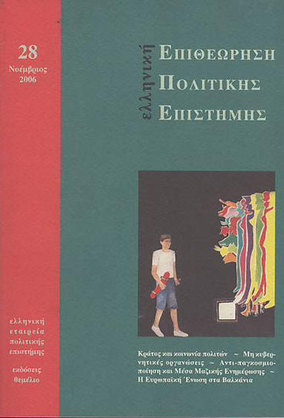Εναλλακτικές προοπτικές για το μέλλον της Ευρωπαϊκής Ένωσης και οι περιπτώσεις τους στην κοινοτική πολιτική
Part of : Ελληνική Επιθεώρηση Πολιτικής Επιστήμης ; No.5, 1995, pages 5-24
Issue:
Pages:
5-24
Parallel Title:
Some alternative futures for the European polity and their implications for European public policy
Author:
Abstract:
Reflecting on the continuing process of European integration, this article attempts to speculate about the type of polity that seems most likely to emerge in the years to come, as well as the consequences of such a development for the European Union’s public policy. Expecting the future political arrangement to be much more complex that a mere federation of sovereign states, the author utilizes well-known notions from the debate on the nation-state (e.g., authoritative allocations, territorial constituencies, and functional competences) and, using a wholly new political vocabulary, focuses his attention on the growing dissociation between them. More specifically, the examination of the shifting balance between territorial and functional competences (or authorities) leads to four possible outcomes, each representing an ideal type (given Latin appellations): stato/federatiO, confederate, consorte, and condominio.In the author’s belief, an increasingly integrated Europe is already moving in the direction of either consorte or a condominio type. To support this argument, he first examines those features of Euro-polity that seem solidified and are likely to persist. Then he analyzes their implications for the future political outcome. Finally, Schmitter identifies three characteristics of collective decision-making which as he claims, do anything but facilitate solutions resembling the stato/federatio space or the confederatici types. These characteristics are (a) «hegemony», meaning that a particular country or region will eventually predominate, thus imposing policy over the rest of the EU; (b) «verrechtligung» or adjudication of emerging conflicts by the European Court of Justice; and (c) «parliamentarization», which denotes the institutional and practical acceptance of the European Parliament as the Union’s supreme organ.
Subject:
Subject (LC):
Keywords:
Ευρωπαϊκή Ένωση
Notes:
Το κείμενο περιέχει αναθεωρημένες και, αναλυτικότερα, ανεπτυγμένες θέσεις που έχουν πρωτοεμφανιστεί σε άλλο άρθρο με τίτλο «Interests, Functions and Powers: Emergent Properties and Unintended Consequences in the European Polity» και περιέχονται στο υπό έκδοση βιβλίο των Garry Marks - Peter Lange (επιμ.), The Emerging Euro-Polity, Νέα Υόρκη, Cambridge University Press




